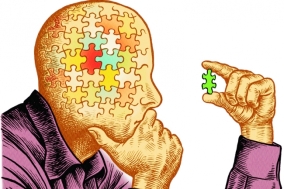
It’s probably fair to say we’re all self-critical to a greater or lesser extent. The trick is to aim to be objective without being judgmental and to be honest without being merciless. I think one of the greatest things about the Enneagram is that it makes that process a little easier and maybe also less painful. It will show you how you repeatedly get in your own way. But it will take the sting out of it by making it clear that you are neither uniquely messed up nor permanently broken.
Here’s the other side of the coin from the last post: answers from the 2015-2017 Enneagram panels to the question What don’t you particularly like about being your type?
How would you answer that question?
Type 1
2015: I don’t like the highly critical nature because I think everyone should do things perfectly. I think they should plan better. They should execute better. They should speak with proper grammar.
2016: I can be too strict with myself.
2017: I dislike when the drive for perfection keeps me from doing what’s important to me or others around me, which is the flip side of the same thing.
Type 2
2015: Something I don’t like is when helping slips into martyrdom. I catch myself sliding into that on occasion, so this has helped me not to slide.
2016: I battle with guilt and fear at times of not being helpful enough. I also have the same fear when dealing with my own needs. I am prideful and don’t want to be a burden to others, so I’m not likely to tell you that I don’t like what you’re doing or I don’t like what we’re planning to do. I sometimes swallow that, which is not that good for my health, either. I’m easily distracted by others and their needs and I’m quick to the rescue at the risk to my own health.
2017: I can be really externally focused. I can be an approval-whore, OK? It’s important for you to like me. And I used to blame this on my mother because she had a saying that meant what are the neighbors going to say? So I grew up thinking oh my gosh; what if I do this and what if the neighbors don’t like it? And “the neighbors” then translates to everybody.
Type 3
2015: Something I don’t particularly like is that the busyness and the productivity don’t always serve me. I’ve always had this analogy about life being like spinning plates. Spinning plates have absolutely no purpose; they just keep you busy to keep from crashing.
2016/2017: The term workaholic was made just for me. I crave external validation. My achievements equal my value. I love doing and I hate being. And I am competitive.
Type 4
2015/2016: What I don’t like is being overly sensitive to things people say and do, taking them personally, and then brooding about them.
2017: What I don’t like is the loneliness even though I know I’ve self-imposed it in some ways. It’s still something that I don’t like a lot.
Type 5
2015/2016: What I don’t like is that it’s very easy for me to detach from what’s going on around me. However, I’m a great crisis manager because 5s are very good at detaching and dealing with whatever is driving everyone else crazy.
2017: (I’m creative. I like that.) But I’m also disorganized, which can be a pain in the ass. (I can focus really well), but sometimes I focus on the wrong things.
Type 6
2015: What I don’t like is that I overthink everything. That’s why I’m overwhelmed all the time. And when I make a decision, I doubt myself. Then I go out and ask everybody else. What do you think? Should I do this? Should I go there?
2016: Loyalty can also just be stubbornness and unwillingness to leave bad situations. And awareness can also be me thinking that I know what’s going on when I really don’t.
2017: Things I don’t like include equivocating too much, analyzing too much, and being overly cautious.
Type 7
2015: What I don’t like about being a 7 is I have an 8 wing, which means I can anger quickly and become confrontational and threatening. I also don’t like being somewhat scattered and trying to do too many things at once—but only sometimes.
2016: The stubbornness gets in the way occasionally. You and I can go to the same spot over there, but my way is going to be the right way.
2017: I’m anxious and overwhelmed and horribly impatient. Like the external world is…I don’t know…it’s a pain in the butt. There’s just so many possibilities out there and I can see all of them. I can imagine all of them. I can do all of them, all at the same time. Yeah, that doesn’t really work, but that’s what I feel.
Type 8
2015: I don’t like the knee-jerk reactions. Being opinionated. And I think the more I get to know myself as I get older, it’s nice to know where that comes from and to be able to soften it a little bit so people don’t always think we bite.
2016: I don’t like my impatience with others.
2017: I really have identified that I had a feeling once—and I got married. And it was wonderful. But I’m done now. Actually, I feel all the time; I just don’t know how to deal with it. So I put it aside.
Type 9
2015: I don’t like the automatic resistance. It’s not just resistance to you but it’s resistance from within as well. It’s still there, but I see it now. Oh, that’s just me resisting.
2016: It’s very challenging for me to confront people that are chose to me in a conflict, in a difficult situation.
2017: I’m easily distracted, and so I lose focus pretty readily, and that can get in my way and be really, really irritating. I have all these things I want to get done, but…squirrel! Now I’m doing something else.


 During the past two years, treatment of several heart-related health issues has significantly impeded my progress. For an 8w7 such as myself, the situation is annoying at best and excruciating at worst. But I have taken charge of the treatment, to the extent that I can, and am taking steps to get back on track.
During the past two years, treatment of several heart-related health issues has significantly impeded my progress. For an 8w7 such as myself, the situation is annoying at best and excruciating at worst. But I have taken charge of the treatment, to the extent that I can, and am taking steps to get back on track. This is the fifth in the series of responses to the questions and situations posed to last year’s panel of all nine Enneagram types. (Read the four previous posts for more of their responses.)
This is the fifth in the series of responses to the questions and situations posed to last year’s panel of all nine Enneagram types. (Read the four previous posts for more of their responses.) Here are the responses from the nine people on last year’s Enneagram Panel to the third of the four situations they were presented with. (Read the previous three posts for more of their responses.)
Here are the responses from the nine people on last year’s Enneagram Panel to the third of the four situations they were presented with. (Read the previous three posts for more of their responses.) This is the second hypothetical situation posed to the members of last year’s Enneagram panel.
This is the second hypothetical situation posed to the members of last year’s Enneagram panel. This is the second in a series of posts based on answers from the nine different types on last year’s Enneagram panel. In the previous post, we learned three words each person would use to describe their type and what they liked and didn’t like about being their type. This time, we’ll find out how they would react to one of four hypothetical situations posed to them.
This is the second in a series of posts based on answers from the nine different types on last year’s Enneagram panel. In the previous post, we learned three words each person would use to describe their type and what they liked and didn’t like about being their type. This time, we’ll find out how they would react to one of four hypothetical situations posed to them.

